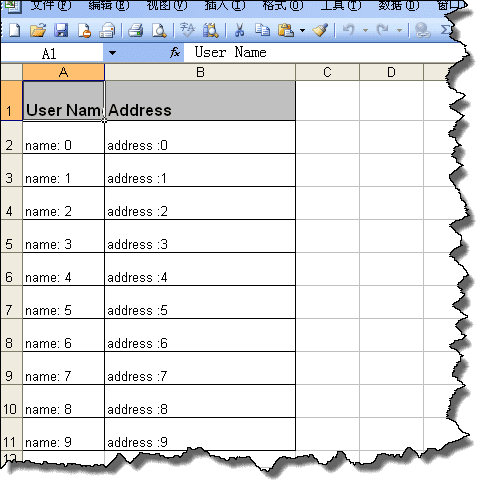在用java 写数据库应用的时候, 通常会生成各种报表,而这些报表可能会被导出为各种格式的文件,比如Excel文档,pdf 文档等等. 今天先做了一个生成Excel 文档的例子,主要解决以下问题:
生成 Excel 文档.
保护生成Excel文档,设置密码访问.
自动对生成的Excel 文档第一行标题栏设置成filter 过滤形式, 方便用户使用.
用 apache POI 生成 Excel 文档公用类
package com.yihaomen.poi.sample;
import java.lang.reflect.InvocationTargetException;
import java.lang.reflect.Method;
import java.text.SimpleDateFormat;
import java.util.Date;
import java.util.HashMap;
import java.util.List;
import java.util.Map;
import org.apache.poi.hssf.usermodel.HSSFCellStyle;
import org.apache.poi.hssf.usermodel.HSSFFont;
import org.apache.poi.hssf.usermodel.HSSFSheet;
import org.apache.poi.hssf.usermodel.HSSFWorkbook;
import org.apache.poi.hssf.util.HSSFColor;
import org.apache.poi.ss.usermodel.Cell;
import org.apache.poi.ss.usermodel.Row;
import org.apache.poi.xssf.usermodel.XSSFSheet;
/**
* Excel util, create excel sheet, cell and style.
* @param <T> generic class.
*/
public class ExcelUtil<T> {
public HSSFCellStyle getCellStyle(HSSFWorkbook workbook,boolean isHeader){
HSSFCellStyle style = workbook.createCellStyle();
style.setBorderBottom(HSSFCellStyle.BORDER_THIN);
style.setBorderLeft(HSSFCellStyle.BORDER_THIN);
style.setBorderRight(HSSFCellStyle.BORDER_THIN);
style.setBorderTop(HSSFCellStyle.BORDER_THIN);
style.setLocked(true);
if (isHeader) {
style.setFillForegroundColor(HSSFColor.GREY_25_PERCENT.index);
style.setFillPattern(HSSFCellStyle.SOLID_FOREGROUND);
HSSFFont font = workbook.createFont();
font.setColor(HSSFColor.BLACK.index);
font.setFontHeightInPoints((short) 12);
font.setBoldweight(HSSFFont.BOLDWEIGHT_BOLD);
style.setFont(font);
}
return style;
}
public void generateHeader(HSSFWorkbook workbook,HSSFSheet sheet,String[] headerColumns){
HSSFCellStyle style = getCellStyle(workbook,true);
Row row = sheet.createRow(0);
row.setHeightInPoints(30);
for(int i=0;i<headerColumns.length;i++){
Cell cell = row.createCell(i);
String[] column = headerColumns[i].split("_#_");
sheet.setColumnWidth(i, Integer.valueOf(column[1]));
cell.setCellValue(column[0]);
cell.setCellStyle(style);
}
}
@SuppressWarnings({ "rawtypes", "unchecked" })
public HSSFSheet creatAuditSheet(HSSFWorkbook workbook,String sheetName,List<T> dataset,String[] headerColumns,String[] fieldColumns)
throws NoSuchMethodException, IllegalAccessException, IllegalArgumentException, InvocationTargetException {
HSSFSheet sheet = workbook.createSheet(sheetName);
sheet.protectSheet("");
generateHeader(workbook,sheet,headerColumns);
HSSFCellStyle style = getCellStyle(workbook,false);
SimpleDateFormat sd = new SimpleDateFormat("yyyy-MM-dd");
int rowNum = 0;
for(T t:dataset){
rowNum++ ;
Row row = sheet.createRow(rowNum);
row.setHeightInPoints(25);
for(int i = 0; i < fieldColumns.length; i++){
String fieldName = fieldColumns[i] ;
String getMethodName = "get" + fieldName.substring(0,1).toUpperCase() + fieldName.substring(1);
try {
Class clazz = t.getClass();
Method getMethod;
getMethod = clazz.getMethod(getMethodName, new Class[]{} );
Object value = getMethod.invoke(t, new Object[]{});
String cellValue = "";
if (value instanceof Date){
Date date = (Date)value;
cellValue = sd.format(date);
}else{
cellValue = null != value ? value.toString() : "";
}
Cell cell = row.createCell(i);
cell.setCellStyle(style);
cell.setCellValue(cellValue);
} catch (Exception e) {
}
}
}
return sheet;
}
}
这一个公用的类,主要生成Excel的头,正文,以及Excel 文档的样式。看方法名称基本就可以知道这个方法是干什么用的.
写一个测试类测试生成Excel文档
package com.yihaomen.poi.test;
import java.io.FileOutputStream;
import java.io.IOException;
import java.lang.reflect.InvocationTargetException;
import java.util.ArrayList;
import java.util.List;
import org.apache.poi.hssf.usermodel.HSSFWorkbook;
import com.yihaomen.poi.sample.ExcelUtil;
import com.yihaomen.poi.sample.User;
public class PoiTest {
/*excel column formate:column_#_width, excel中每一列的名称*/
public static final String[] USER_RECORES_COLUMNS = new String[]{
"User Name_#_3000",
"Address_#_7000"
};
/*the column will display on xls files. must the same as the entity fields.对应上面的字段.*/
public static final String[] USER_RECORES_FIELDS = new String[]{
"name","address"
};
public static void main(String[] args) throws NoSuchMethodException, IllegalAccessException, IllegalArgumentException, InvocationTargetException, IOException {
List<User> users = new ArrayList<User>();
for(int i=0; i<10;i++){
User u = new User();
u.setAddress("address :" + i);
u.setName("name: "+ i);
u.setAge(i);
users.add(u);
}
//实际项目中,这个list 估计是从数据库中得到的
HSSFWorkbook workbook = new HSSFWorkbook();
ExcelUtil<User> userSheet = new ExcelUtil<User>();
userSheet.creatAuditSheet(workbook, "user sheet xls",
users, USER_RECORES_COLUMNS, USER_RECORES_FIELDS);
FileOutputStream fileOut = new FileOutputStream("d:/yihaomen_user_test.xls");
workbook.write(fileOut);
fileOut.close();
}
}
这里直接保存文件到 D 盘下面,主要是为了自己测试方便. 另外还需要一个测试需要的
实体类 User.java:
package com.yihaomen.poi.sample;
public class User {
private String name;
private int age;
private String address;
public String getName() {
return name;
}
public void setName(String name) {
this.name = name;
}
public int getAge() {
return age;
}
public void setAge(int age) {
this.age = age;
}
public String getAddress() {
return address;
}
public void setAddress(String address) {
this.address = address;
}
}
运行测试类,生成Excel 文档如下:

生成的文档,你是不能修改的,原因很简单,设置了一个空密码,虽然是空密码,Excel 还是会出现提示,当然你可以直接解保护. 实现的主要代码是在 ExcelUtil 中的 creatAuditSheet 方法中的:
sheet.protectSheet(""); // 设置了一个空的密码
如果要实现第一行标题自动过滤怎么处理呢,可以在上面提到的方法中加入如下代码:
char[] endChar = Character.toChars( 'A' + (headerColumns.length - 1) ); String rangeAddress = "A1:" + String.valueOf(endChar) + "1"; sheet.setAutoFilter(CellRangeAddress.valueOf(rangeAddress));
这样就能实现自动过滤了








